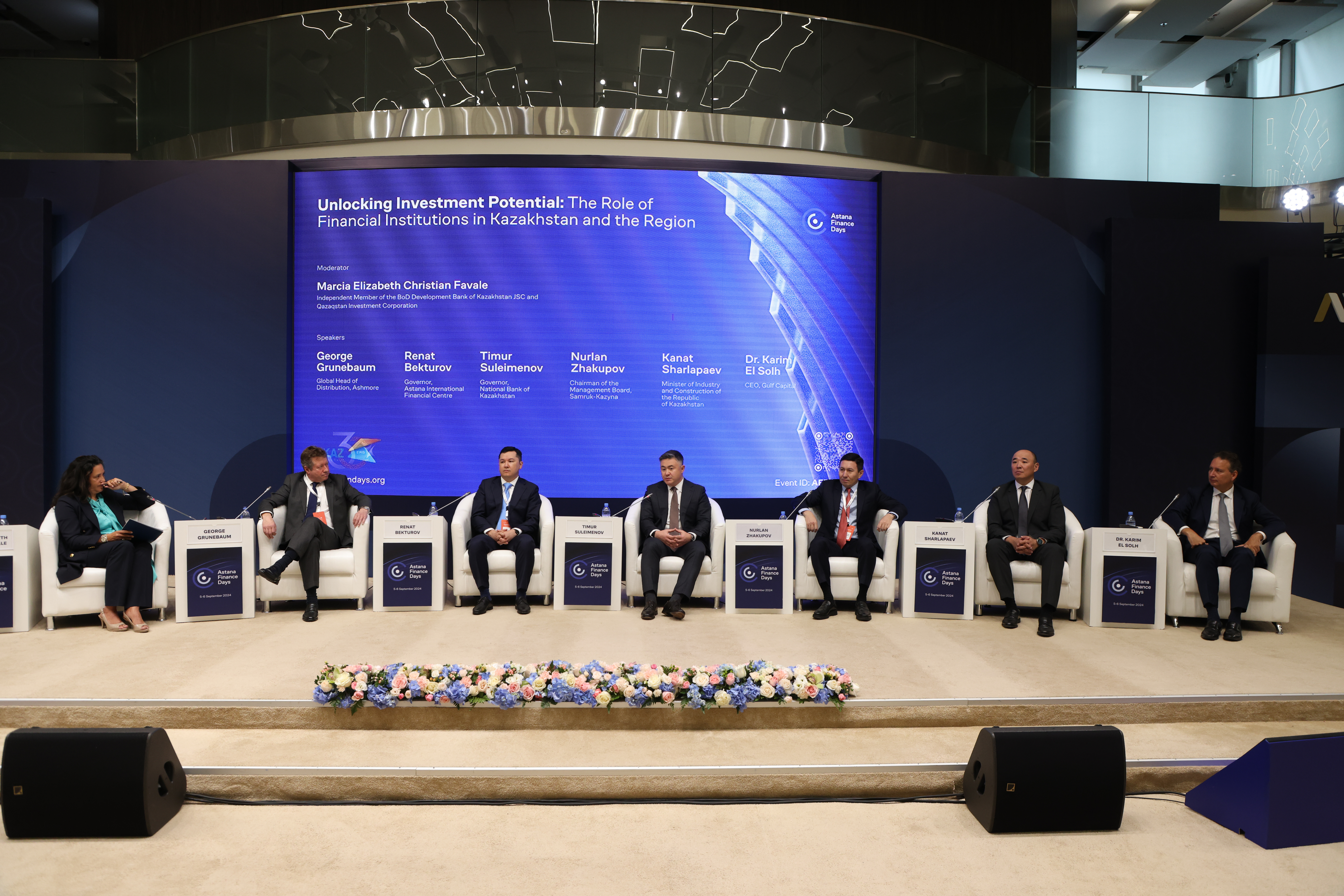ASTANA – Astana Finance Days (AFD), organized by the Astana International Financial Centre (AIFC), continues with a series of discussions on topics including investment potential, financial institutions’ roles, data protection, artificial intelligence (AI) in business, the creation of a voluntary carbon market in Kazakhstan, capital markets, financial technologies, and Islamic financial solutions for both corporate and retail sectors.

L-R: Marcia Elizabeth Christian Favale, George Grunebaum, Renat Bekturov, Timur Suleimenov, Nurlan Zhakupov, Kanat Sharlapaev, Dr. Karim El Solh. Photo credit: AIFC.
Investment opportunities and insights
The session Unlocking Investment Potential: The Role of Financial Institutions in Kazakhstan and the Region explored the region’s investment opportunities and strategies.
Timur Suleimenov, Chairman of the National Bank of Kazakhstan, spoke about attracting investments while safeguarding reserves for future generations. He emphasized the importance of the AIFC as a key investment mechanism.
“In Kazakhstan, access to trade and investment is crucial. As a World Trade Organization member, we cannot isolate ourselves from incoming goods, so currency fluctuations will affect us. We must continuously focus on investments and their importance,” said Suleimenov.
He also addressed the challenges of maintaining the tenge’s value, noting that Kazakhstan has had a free-floating exchange rate since 2015. Recent National Bank interventions were made in response to geopolitical issues and supply chain disruptions, aiming to convert reserves rather than interfere in the market.
Kanat Sharlapaev, Minister of Industry and Construction highlighted the need to address infrastructure challenges despite impressive growth in the construction sector. He called for a reassessment of infrastructure foundations to support sustainable development.
George Grunebaum, Global Head of Distribution at Ashmore, explained why the firm invests in Kazakhstan.
“I specialize in emerging markets, assessing a country’s economic fundamentals. We examine growth, inflation targeting, structural reforms, stability, and transparency. Kazakhstan has made notable progress in these areas, which is why we have invested here on the exchanges for an extended period,” he said.
Renat Bekturov, Managing Director of the AIFC, detailed the center’s efforts to reduce investment risks and transaction costs. By adopting common law practices familiar to companies from the United Kingdom, the Middle East, and Asia, the AIFC aims to enhance transaction efficiency and investment stability.
Bekturov emphasized the goal of creating a direct capital market without intermediaries, increasing asset liquidity and trade.
“We need to attract foreign managers and develop success stories to become more prominent in the global capital market. Our focus will be on private and venture capital,” he said.
Belt and Road Initiative and regional partnerships
At the Belt and Road Initiative (BRI) session, Lyu Hao, Executive Vice President of the Shanghai Stock Exchange, discussed partnerships with Kazakh companies, highlighting the AIFC’s role as a major financial hub for Central Asia.
“The AIFC is more than just a financial center in Kazakhstan. It serves as a financial hub for all of Central Asia. Our longstanding relationship shows that many Kazakh businesses are expanding into neighboring countries like Uzbekistan and the Kyrgyz Republic, and the broader Central Asian market. We are seeing growth in trade relations between Kazakhstan and China, as well as improvements in the financial sector,” he said.
Damir Kozhakmetov, CEO of KTZ Express (a subsidiary of Kazakhstan Temir Zholy), addressed the impact of the BRI on transit. He emphasized Kazakhstan’s importance as a key transit hub linking Europe and China.
“We established a joint venture with the port of Lianyungang in China and launched a second project with the same port in 2017, opening the main Khorgos terminal on the China-Kazakhstan border. This year, we initiated a third project with Lianyungang in Aktau. This project is a significant infrastructure development along the Middle Corridor, in collaboration with our Chinese partners,” said Kozhakmetov.
Lawrence Tsang, Co-Head of the Belt and Road Department at TF International Securities, noted the company’s growing focus on Central Asia and the Middle East.
He praised Kazakhstan’s competitive firms and their potential for initial public offerings (IPOs) in Hong Kong.
Challenges and legislative need in AI
At a panel session dedicated to AI in business, speakers underscored the technology’s pervasive role in various applications, raising two primary concerns: data security and ethical issues, such as misinformation and fraud.
They noted that organized criminal groups, resembling corporate structures, are increasingly behind cyberattacks, highlighting the urgent need for a strong culture of data protection and enhanced public awareness to address these threats.
Dana Utegen, Teaching Professor at Maqsut Narikbayev University and Head of DRCQ at the AIFC also stressed the importance of robust legislation to safeguard data, drawing parallels with fragmented data protection laws in the United States. She advocated for national regulations on AI, emphasizing the need to ban social scoring based on age, race, or gender.
Notable highlights
The conference included a business breakfast where the AIFC unveiled its new initiative, the AIFC Business Club. This membership-based program aims to bring together senior executives, company owners, and entrepreneurs into a network of visionary leaders. The initiative seeks to support business growth, encourage collaboration, and drive innovation within and beyond the AIFC.
In another development, Astana International Exchange (AIX) and Oman’s Muscat Securities Market (MSX) have signed a memorandum of cooperation to facilitate cross-exchange trading through the digital hub Tabadul.
This agreement initiates a partnership focused on exploring mutually beneficial opportunities. The collaboration aims to improve market liquidity and simplify trading mechanisms for securities listed on both MSX and AIX. Both exchanges are participants in Tabadul, a digital exchange hub established by the Abu Dhabi Securities Exchange (ADX) to enable cross-exchange trading.


